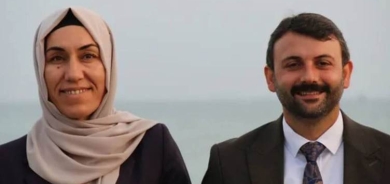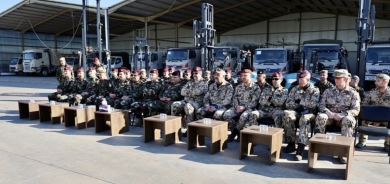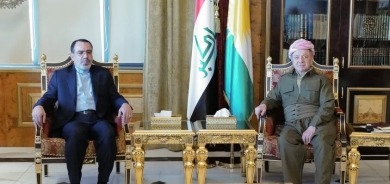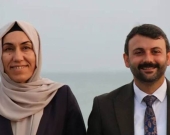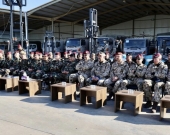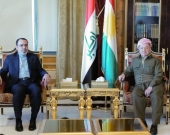Syrian Kurds Should Follow Example of Iraqi Counterparts

It becomes increasingly clear that permanent peace cannot be attained in Syria if the Assad regime remains in power. Nevertheless, there is an alliance that supports it, led by Russia on the international front and backed by the pro-establishment Kemalist groups in Turkey. They used to argue that there is still hope for the Assad regime and that it still maintains popular support.
This supportive alliance also perceived any critique against the Assad regime as an intervention into the domestic affairs of another country. There is a broad coalition in Turkey against the government’s stance on the Syrian issue. This coalition is pioneered by the Republican People’s Party and is supported by a significant segment of the media.
While some Turkish political parties sent delegations to Syria and declared their support for Assad, some columnists penned meaningless and contradictory articles claiming that Assad will not be toppled like Saddam due to his domestic popularity. Others portrayed the Syrian uprising as a sectarian conflict, therefore attempting to exonerate the massacres that were carried out by the Assad regime. Attempts to justify Assad and his bloody regime are akin to protecting the 1917 revolution against imperialism.
The issue was taken so far that they even asserted that the international community should not forsake Assad. After reading all of these opinions, it is possible to think that the third world war will start because of Assad.
These same people held similar views about the Iraqi Baath party and Saddam. They used to claim that the Arabs would not abandon Saddam, Iraq would be the new Vietnam for the US, the intervention in Iraq would generate a new Arab resistance and Arab nationalism would be revived under Saddam’s leadership.
None of these claims turned out to be true and Saddam’s army was surrounded without any resistance.
Ironically, Saddam asked for the help of the Kurds — the people he massacred the most — during his downfall. The Kurds did not respond to this call. Instead, they decided to take part in the transformation process. As a result of looking toward the future rather than the past, the new Iraq brought freedom for the Kurds. Jalal Talabani, who has been the leader of a major Kurdish party (PUK) since the seventies, is now the president of Iraq.
It was not easy to establish a new state order in Iraq during the post-Saddam period. The new Iraq brought freedom for Kurds, but it is not yet possible to say that their liberties are are equally enjoyed in other parts of the country. The Iraqi Kurds are unified under one nation while the Arabs are divided.
A similar path will be followed by the Syrian Kurds as well. The Syrian opposition has elected Abdul Basit Sieda, an exiled Kurdish academic living in Sweden, as their leader. It has been said that the Syrian opposition lacked a charismatic leader, and there were even those who claimed that this handicap has prolonged Assad’s rule.
Sieda, the new chair of the Syrian National Council, is known for his liberal views. After his election he made a call to the international community, urging for the protection of civilians. He also addressed the Christian and Alawite population in Syria, where they are afraid of the Sunni Muslim majority, and ensured them that their rights will be protected in the post-Assad era. He promised that there would not be any ethnic or religious discrimination in the new Syria.
This reminds me of the process in Iraq. It seems that the Syrian Kurds will assume a similar similar role to the one that of the Kurds in Iraq. The Kurds of Syria will shape the country’s future, as the Iraqi Kurds did in Iraq.
Kurds can have a functional value in Syria, which is no different from Iraq in terms of ethnic and religious diversity. They can facilitate the transitional process and engage in a political mission which will be trusted by other groups.
The fall of Saddam was among the incidents that triggered the Arab Spring in the Middle East and north Africa. With the Iraqi occupation and the fall of Saddam, significant changes occurred in the policies of the major Kurdish parties. This will be accelerated with the fall of the Ba'ath regime in Syria.
Actually, in Iraq and Syria, the Kurds have taken the right stance and, like Turkey, have not made any mistakes. Turkey’s policy during the last decades mainly corresponded with the interest of the Kurds in Syria and Iraq. Though Turkey’s domestic policy regarding the Kurds still falls short, it becomes more and more clear that it was very wise of Turkey to maintain good relations with Iraqi Kurdistan. This idea started with Turgut Özal, who invested heavily in the promotion of these relations. Similarly, it will become evident that Turkey’s stance on the Syrian issue is spot on.
The major problem of those who are dominating Kurdish politics in Turkey is their incapability to understand the new geopolitical scene that emerged in the early 2000s. They have a difficult time adjusting their position to the new developments in Iraq, Syria and Turkey.
Their position is based on ideology, not on real politics. This made them take the same position of the Baathists in Syria and the Kemalists in Turkey.
There is a heavy price to be paid for this ideological blindness. In all three countries, there will be consequences for not taking part in the transformational process and remaining loyal to the status quo. Unfortunately, this price was mainly and still is being by paid by the Kurds of Turkey.
REUTERS


